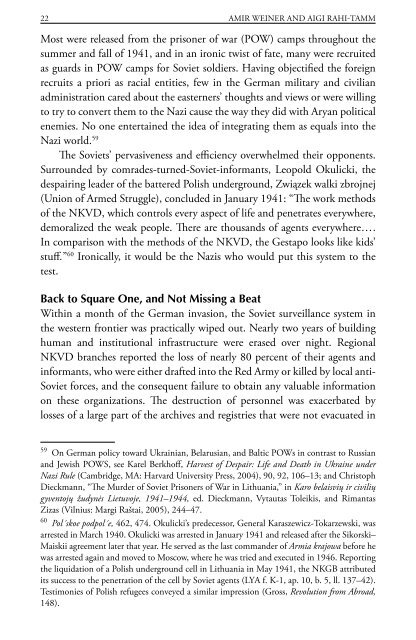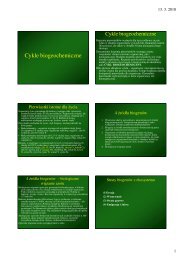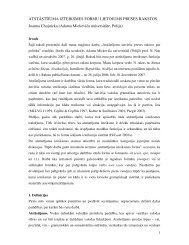Amir Weiner Getting to Know You
Amir Weiner Getting to Know You
Amir Weiner Getting to Know You
You also want an ePaper? Increase the reach of your titles
YUMPU automatically turns print PDFs into web optimized ePapers that Google loves.
22 AMIR WEINER AND AIGI RAHI-TAMM<br />
Most were released from the prisoner of war (POW) camps throughout the<br />
summer and fall of 1941, and in an ironic twist of fate, many were recruited<br />
as guards in POW camps for Soviet soldiers. Having objectified the foreign<br />
recruits a priori as racial entities, few in the German military and civilian<br />
administration cared about the easterners’ thoughts and views or were willing<br />
<strong>to</strong> try <strong>to</strong> convert them <strong>to</strong> the Nazi cause the way they did with Aryan political<br />
enemies. No one entertained the idea of integrating them as equals in<strong>to</strong> the<br />
Nazi world. 59<br />
The Soviets’ pervasiveness and efficiency overwhelmed their opponents.<br />
Surrounded by comrades-turned-Soviet-informants, Leopold Okulicki, the<br />
despairing leader of the battered Polish underground, Związek walki zbrojnej<br />
(Union of Armed Struggle), concluded in January 1941: “The work methods<br />
of the NKVD, which controls every aspect of life and penetrates everywhere,<br />
demoralized the weak people. There are thousands of agents everywhere… .<br />
In comparison with the methods of the NKVD, the Gestapo looks like kids’<br />
stuff.” 60 Ironically, it would be the Nazis who would put this system <strong>to</strong> the<br />
test.<br />
Back <strong>to</strong> Square One, and Not Missing a Beat<br />
Within a month of the German invasion, the Soviet surveillance system in<br />
the western frontier was practically wiped out. Nearly two years of building<br />
human and institutional infrastructure were erased over night. Regional<br />
NKVD branches reported the loss of nearly 80 percent of their agents and<br />
informants, who were either drafted in<strong>to</strong> the Red Army or killed by local anti-<br />
Soviet forces, and the consequent failure <strong>to</strong> obtain any valuable information<br />
on these organizations. The destruction of personnel was exacerbated by<br />
losses of a large part of the archives and registries that were not evacuated in<br />
59 On German policy <strong>to</strong>ward Ukrainian, Belarusian, and Baltic POWs in contrast <strong>to</strong> Russian<br />
and Jewish POWS, see Karel Berkhoff, Harvest of Despair: Life and Death in Ukraine under<br />
Nazi Rule (Cambridge, MA: Harvard University Press, 2004), 90, 92, 106–13; and Chris<strong>to</strong>ph<br />
Dieckmann, “The Murder of Soviet Prisoners of War in Lithuania,” in Karo belaisvių ir civilių<br />
gyven<strong>to</strong>jų žudynės Lietuvoje, 1941–1944, ed. Dieckmann, Vytautas Toleikis, and Rimantas<br />
Zizas (Vilnius: Margi Raštai, 2005), 244–47.<br />
60 Pol´skoe podpol´e, 462, 474. Okulicki’s predecessor, General Karaszewicz-Tokarzewski, was<br />
arrested in March 1940. Okulicki was arrested in January 1941 and released after the Sikorski–<br />
Maiskii agreement later that year. He served as the last commander of Armia krajowa before he<br />
was arrested again and moved <strong>to</strong> Moscow, where he was tried and executed in 1946. Reporting<br />
the liquidation of a Polish underground cell in Lithuania in May 1941, the NKGB attributed<br />
its success <strong>to</strong> the penetration of the cell by Soviet agents (LYA f. K-1, ap. 10, b. 5, ll. 137–42).<br />
Testimonies of Polish refugees conveyed a similar impression (Gross, Revolution from Abroad,<br />
148).

















